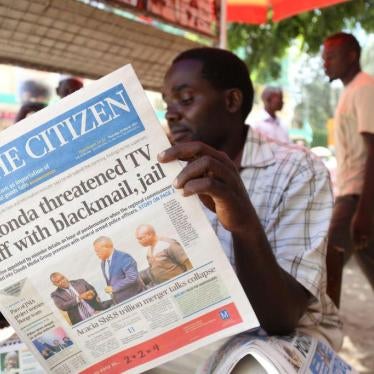Human Rights Watch welcomes the conclusions of the recent progress report of the independent expert on the situation of human rights in Sudan. We urge the Human Rights Council to give particular attention to addressing the lack of protection of the human rights of civilians; the culture of impunity; and in promoting the civil and political rights across Sudan in the lead up to the referendum.
In Darfur, the peace process has stalled and violence has increased in the face of shrinking access to affected areas by UNAMID and humanitarian agencies. This lack of access exacerbates the information vacuum caused by the March 2009 expulsions of 13 humanitarian organizations from Darfur. Civilians continue to be the first victims of inter-factional rebel fighting and government clashes with rebel groups, notably the Justice and Equality Movement. The lack of access to justice and the continued impunity for crimes committed in Darfur constitute aggravating factors and underscore the need to implement all recommendations put forth by the Group of Experts on Darfur in 2008.
In Southern Sudan, the increase in inter-ethnic violence in 2010, ongoing resource conflicts, and attacks on civilians by the Ugandan Lord’s Resistance Army in Western Equatoria, demonstrate the inability of southern government authorities or the UN Mission in Sudan to protect civilians. The almost total absence of rule-of-law institutions in most of Southern Sudan is a key element of this failure to protect civilians. Southern security forces were also responsible for human rights violations during the April elections, and in the post-elections period – particularly in Upper Nile and Jonglei states during military operations against renegade military commanders, alleged militia forces, and opponents of the ruling party.
The independent expert highlighted his concern about flaws in the National Intelligence and Security Services Law, which retains broad powers of arrest and detention, and other criminal laws that fall short of international standards. These laws provide a legal basis for arbitrary arrest and prolonged detention without trial in northern states and in Darfur. Human Rights Watch documented numerous cases of harassment, arrests and detentions of journalists, opposition supporters and independent candidates, before and during the April 2010 elections, by both northern and southern authorities.
The authorities in northern Sudan arbitrarily arrested high-profile opposition figures and journalists following the elections, demonstrating the continued restriction of the right to freedom of expression. They also continued to arbitrarily arrest and detain Darfur student activists without charge, sometimes in undisclosed locations, which amounts to an enforced disappearance.
The protection of the rights to freedom of expression, peaceful assembly and movement to polling stations for all eligible voters is essential prior to the southern self-determination referendum. In northern Sudan and Southern Sudan, journalists and other members of civil society members have expressed their concerns about their freedom to openly discuss outcomes of the referendum that the ruling party does not support.
To respond to the needs of millions of people affected by grave human rights abuses committed both by government forces and non-state armed groups in Sudan, the Human Rights Council must renew the mandate of the independent expert on the human rights situation in Sudan and strengthen its response to the post-election repression, the increasing violence in Darfur, and ongoing insecurity and human rights abuses by the security forces in Southern Sudan.







